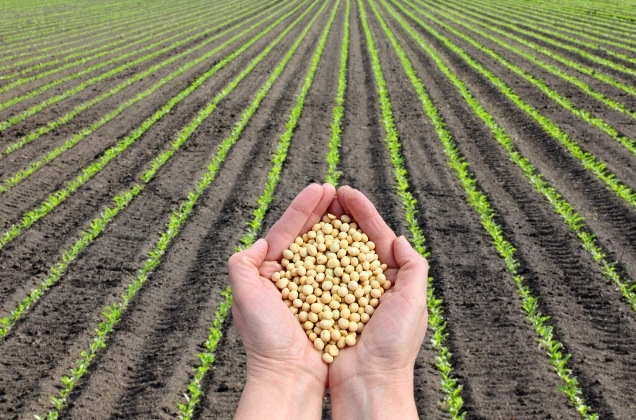06/08/2025
Selim Çetiner
Sabancı University Faculty of Engineering and Natural Sciences Faculty Member

'Organic agriculture' or 'organic products' are not, as you might imagine, naturally grown. So, what actually is organic agriculture?
When you Google "Organic Agriculture," the first thing that comes up on the Ministry of Agriculture and Rural Affairs' website is "Organic Agriculture is a form of agricultural production that is controlled and certified at every stage, from production to consumption, without the use of chemical inputs,". You can find similar definitions to this in almost all domestic and foreign sources about organic agriculture. However, some countries, aware that this terminology doesn't reflect reality, prefer the terms "ecological agriculture" or "biological agriculture" instead of "organic agriculture." If you ask why, although it has slightly different meanings in various languages, organic defines molecules or events "related to living organisms." Therefore, it's impossible to grow a plant or animal that isn't organic.
Furthermore, when we look at the equally problematic first part of this definition, it states: "a method of production conducted without the use of chemical inputs." Undoubtedly, this claim is what most attracts people to "organic food." In this article, I will first attempt to enlighten readers on the "production conducted without the use of chemical inputs" claim. In subsequent articles, we will explore questions such as whether organic products are more nutritious and more delicious, and whether it is possible to feed a growing population through organic production.
To briefly summarize the inception and development of the "Organic Agriculture" movement, it would be appropriate to do so by remembering a few pioneering individuals who were themselves involved in agriculture and keenly observed natural life cycles. For example, in his book titled “Agriculture Course” written in 1924, German mystic anthropologist Rudolf Steiner focused on the health of the soil while explaining the philosophy of “biodynamic” agriculture, and emphasized the composting of all kinds of plant and animal waste from the farm and returning it to the soil in order to replace the minerals removed (exploited) from the soil by plant production.
In fact, the works of Aristotle's student Theophrastus reveal that legumes like chickpeas and peas have been used to enrich the soil since at least the ancient Greeks. Interestingly, in ancient Greece, the soul was believed to reside within the human body. Therefore, eating legumes like lentils and chickpeas was not permissible; these foods caused gas and caused the soul to fly away. However, it was known that they absolutely had to be planted to enrich the soil.
Albert Howard, who served in India, a British colony until the middle of the last century, wrote in his 1940 work titled "An Agricultural Testament" that the future of humanity and civilization hinged on the question, "Will people be able to protect their activities, and indeed their most important asset, the soil and its fertility?" According to Howard, soil fertility could only be achieved by meticulously calculating the minerals removed from the soil and returning them to it. Only people who ate from crops grown in such soil could be healthy. Otherwise, both the soil and people would suffer from disease.
Influenced by Howard's writings, Lady Balfour, one of England's first female agricultural engineers, purchased a farm in Suffolk and began comparing conventional and "natural" farming techniques. Later, with the participation of some farmers and scientists, she founded the "Soil Association" in 1946. Balfour, who also served as the first president of the "Soil Association," the largest organic producer association in England today, stated in her book "The Living Soil" that "sustainable agriculture means the continued biological activity in all links of the food chain, including the soil, through the application of techniques that will maintain soil fertility indefinitely, provide it with renewable resources whenever possible, and avoid excessive environmental pollution."
Indeed, the philosophy of organic farming is most succinctly expressed by the organic products company "The Duchy Originals," founded by Prince Charles in the 1990s: "For people to survive and thrive, they must live in harmony that does not disrupt the delicate balance between plants, animals, and other living things in nature. This is only possible by using agricultural methods that enrich and protect the soil without over-depleting natural resources, harming the natural environment, or causing environmental pollution. Even a handful of soil contains millions of living organisms, which will also be essential for future food production. These are essential for soil fertility. Protecting this vital part of the soil and preventing erosion is essential for the future of humanity."
The concept of "sustainable agriculture," which involves increasing soil fertility with natural fertilizers instead of artificial ones, forms the basis of today's "organic agriculture." Another pillar of today's organic agriculture is the avoidance of synthetic pesticides (chemicals that combat plant diseases and pests).
Rachel Carson was the first to draw attention to the negative effects of synthetic pesticides used in agriculture on the natural environment by publishing a book titled "Silent Spring" in 1962. Thanks to Carson's magnificent book, DDT was banned first in the US and other developed countries, and then in Turkey. As someone who has personally observed how excessive and reckless use of chemicals in agriculture has negatively impacted the wildlife in Çukurova over the last 50 years, I cannot help but acknowledge the impacts of DDT, as well as many other chemicals, on nature and the food chain. It's only natural that consumers are concerned about the reckless use of pesticides in agricultural production.
However, I want to emphasize this point: Organic products are not products that are chemical-free, grow naturally in the bosom of nature, and are delivered to you by our fellow farmers who water the soil with their sweat. While this is true, some of the products you find in organic or ecological markets, such as thyme, sage, bay leaves, and wild mushrooms, may be naturally grown, and we can see some of these products being cultivated in greenhouses.
It's true that most synthetic fertilizers and pesticides are not used when growing organic products. However, some organic fertilizers (like animal manure) but some non-organic fertilizers are used, as specified in Organic Agriculture Law No. 5262 and its two related Regulations. In addition to these, toxic substances of plant origin and non-organic chemicals such as copper oxide and copper sulfate are used, and in large quantities.
Actually, there's no surprise here. Agricultural production itself is a form of struggle with nature. For example, in any place where you farm, another plant in nature will want to grow and thrive alongside the crop you want to grow, competing for water and nutrients in the soil. Since this isn't what farmers want, they need to get rid of this "weed" somehow. So, let's say they pulled the weed without using pesticides or hoeing it mechanically. This time, another living creature in nature that would feed on the pulled weed—for example, the caterpillars of the butterflies we watch with ecstatic eyes flying in the spring—will want to eat the crop we grow, and this time, our crop will be damaged. Various bacteria, fungi or viruses, which are also part of our rich biodiversity, will want to survive on our products, and this will also damage our products.
Organic producers, unable to use synthetic chemical pesticides to combat these pests, will be forced to use alternative chemicals that are equally effective against these insects or pesticides. It's important to remember that organic farmers widely use "plant-derived pesticides," most of which are isolated from plants—and here, we're talking about various modern methods. As a reminder, 99% of the chemicals we're exposed to naturally come from the plants we eat and drink. For example, the coffee we drink every day contains over a thousand chemicals, and 28 of these have been tested, and 19 have been found to cause cancer in mice. Similarly, 71 of the "natural pesticides" derived from plants have been tested, and 37 have been found to be carcinogenic.
Due to consumer outcry and pressure from organic organizations, the use of plants like "Bt corn," which has been rendered insect-resistant by transferring the Bacillus thuringiensis gene using modern biotechnology, has been strictly prohibited in organic farming. However, we know that preparations consisting of the bacteria Bacillus thuringiensis are widely used as insecticides in organic farming.
These are the ones used in the field during production. If you're wondering, "What else is included?" in the organic foods we eat, I recommend checking the Organic Agriculture Regulation on the Ministry of Agriculture's Organic Agriculture website: Additives like E200, E220, E250, E296, and E330—things that make your hair stand on end every time you hear them—are permitted. Surprised? Please don't be.
You can open the Organic Agriculture Regulation at http://www.tarim.gov.tr/uretim/Organik_Tarim,Organik_Tarim.html and see the page-long list of additives for yourself.
It's worth noting that the Organic Agriculture Law and the two related Regulations are essentially identical to the organic agriculture legislation in the European Union. Similarly, the "Organic Rules," which emerged in the US after years of debate, contain similar provisions and are not entirely consistent with the initial organic philosophy I mentioned in the brief history above.
I hope what you've read so far has helped you understand that "organic products" aren't the natural products you envision—in other words, the "What organic farming is not" part of the article's title. If you have plenty of money and it's good for your soul, by all means, continue eating organic. However, keep in mind that organic foods aren't as natural as you might think, nor are they necessarily more nutritious or healthier.




